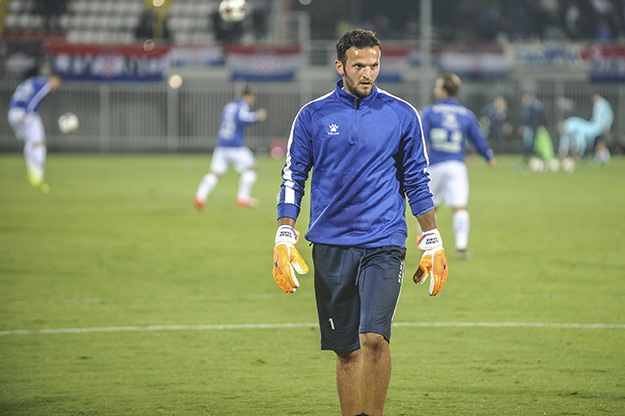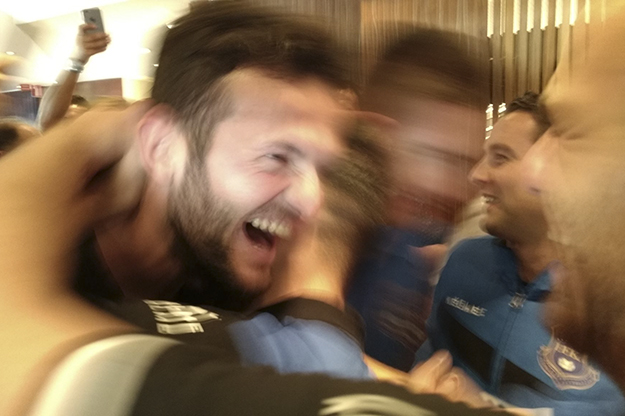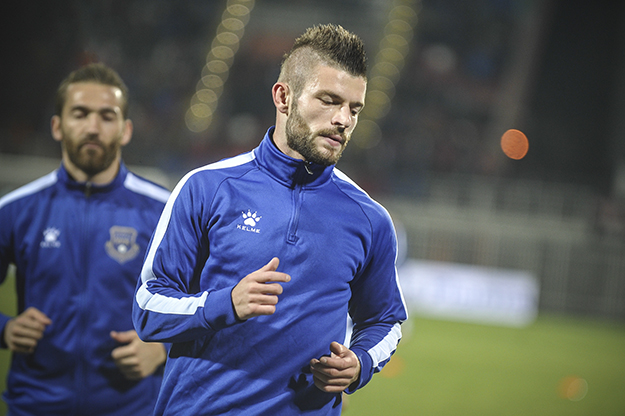Samir Ujkani still didn’t know if he would be playing in Kosovo’s first ever World Cup match, but — given the importance and the pressure — maybe the uncertainty was a good thing after all. Ujkani was sitting in a hotel cafe in central Turku, a tiny city on Finland’s western coast. It was 24 hours before a historic moment in the unfolding story of sport in Kosovo, as it continued its battle to become a fully recognized state. After years of setbacks, blockages and political machinations, the Kosovo national football team was finally about to play its first ever competitive game; a 2018 World Cup qualification match, away from home, against Finland.
It had been a long road for Kosovo. After almost 10 years of trying, FIFA, international football’s governing body, had accepted Kosovo as a member despite strong objections from Serbia and other nations — including Spain — who feared exasperating their restive regions.
It had been a stunning political success for the Football Federation of Kosovo, but it was also where a whole new set of problems began. Who would play for Kosovo? Granit Xhaka, Xherdan Shaqiri, Valon Behrami and others played for their adopted homeland, Switzerland, yet all had strong ties to Kosovo. As far back as 2012, Xhaka had told me that he would consider switching to Kosovo.
It was a politically explosive issue. When Kosovo’s coach Albert Bunjaki tried to pick a squad from Kosovo’s talented diaspora, he was met with a series of roadblocks. The Swiss Football Association argued that its team would have its heart ripped out. Norway, Belgium, Albania, and others would also all lose key players. UEFA and FIFA agreed, banning anyone that had played for another international side after Kosovo’s admission, including members of the Switzerland and Albania Euro 2016 squads. Others would have to apply on a case by case basis.

Kosovo’s goalkeeper and captain, Samir Ujkani, who has undertaken an emotional journey to represent Kosovo. Photo: Atdhe Mulla / K2.0.
Ujkani had once been Albania’s first choice goalkeeper. He and 12 other players who had played for a myriad of other countries but wanted to represent Kosovo, now waited in a hotel in Turku, 24 hours before the match. FIFA had still not made up its mind. Bunjaki still didn’t have a team. “Now? I feel sick to my stomach,” Ujkani admitted, wringing his hands. “I just want a yes or no answer.”
Every player had their own story of surviving the 1990s. Ujkani had been raised in the village of Reznik, near Mitrovica. His father worked in a textile factory in Obilic. They had Serbian friends. But, in 1994, his family was warned that they weren’t safe anymore. So they left. War was coming. Ujkani was six years old and the family resettled in the Belgian town of Tielt.
“I would tell teammates I was going to play for Kosovo and they would say: 'It doesn't exist.'”
Samir Ujkani
He was picked up by Anderlecht’s academy before going on to play for Palermo in Serie A, as well as becoming first choice for the Albanian national team. But when FIFA allowed Kosovo to play friendly matches against other FIFA members in 2014, Ujkani was called up to the team that was due to play Haiti in Mitrovica.
“My father would walk 25 km to go and see Trepca in Mitrovica,” Ujkani recalls. “I decided two days before to play. I didn’t know if FIFA or the Albanian federation would let me. Palermo said be careful you could get a disqualification. But I didn’t care.”
It was a common theme in Italy. Club officials, Ujkani says, had often put pressure on him not to play for Kosovo. “I would tell teammates I was going to play for Kosovo and they would say: ‘It doesn’t exist,’” he reveals. “And I said it does. I was born there. My family lived there. I lost family.”
Two of Ujkani’s uncles and their families stayed. Their houses were burned down at the start of the Kosovo War, with both of the brothers and their wives inside. “I lost respect from the clubs but I am happy because they cannot take this back from me,” he says. “They [the club officials] call me now and apologize, that the time has come and you suffered two years. I didn’t suffer. It was an honor. If you were born in a country and lost family, when a country needs you and you can help them it is an honor.”
In the hotel cafe, the Kosovar players were sitting in little groups, mainly based on the native language of the country their parents fled to in the 1990s. They had just finished their final training session, which had been open to the public. Over a thousand Kosovo fans turned up, flying both Albanian and Kosovo flags. The players were mobbed for selfies afterwards, with most wanting a picture with Red Bull Salzburg’s Valon Berisha, who was already a star in Norway. “They’ve been great,” Berisha responded when I asked how the Norwegian FA reacted to his decision to switch to Kosovo. “They understand that this comes from the heart. And I think my brother’s decision [Veton Berisha chose to stay with Norway] helped too.”
Berisha was also waiting on FIFA’s decision and was worried it would not come through in time. Albanian and Kosovar media had been riddled with speculation based on unnamed inside sources. One website ran a story that Albania was so desperate to keep Milot Rashica they had blocked the switch. Another rumor had spread that Samir Ujkani — the captain, and the one player Bunjaki had told me his team needed above all else — was 99 percent certain to be approved. Another tweeted that nine of the 10 players had been approved, but Berisha had been denied as he had played too many times for Norway. I didn’t mention it. “We have so much talent here, I am just waiting for tomorrow,” Berisha said, before sitting down and dropping his head in his hands.
The day of the game
On the morning of the match, the players, officials and their families regroup again in the hotel lobby. Hours pass and still no news. 3pm comes and goes. Then, suddenly, there is movement. The players gather around Fadil Vokrii, the legendary former Yugoslav international and now president of the federation, and Eroll Salihu, his faithful general secretary, who are on their phones, relaying what they hear.
The crowd of players erupts into cheers and song. Ujkani has tears in his eyes. FIFA’s approval has finally come through less than six hours before kick off and only four hours before the final team sheets need to be handed to the match commissioner. Only one player, Valon Berisha, has not been approved. He stands glumly on his own as the players celebrate. But his approval comes through an hour later. “I’m so happy I went outside and cried!” Ujkani says amidst the congratulations. “The relief came out of me. But now, I sleep for an hour.”

Ujkani on learning he has received permission from FIFA to play in Kosovo’s first ever World Cup qualifier. Photo: James Montague.
At 8pm, a guard of family and friends wait in the hotel lobby for the players to leave. One by one they pass to cheers and wishes of good luck. Proud mothers and fathers, many of whom had made their escape from Kosovo when their sons were too young to remember, cry as they pass on to the waiting bus.
Winter is yet to arrive in Finland. The day has been bathed in warm sunshine, but the nights are getting colder. The walk to the stadium is surprisingly quiet. Groups of Kosovo fans gather outside the Veritas Stadium, but there’s none of the commotion and pyrotechnics that you would normally associate with a match in Kosovo or Albania. The fans are muted, nervous even.
The loudest presence is Kosovo’s head of security. He stands on a box in front of a crowd of Kosovo fans and informs them that no Albanian flags will be allowed in. The Football Association of Finland have said they will be banned as the flag constituted a “political symbol.” “Our flag is blue, not red!” the Kosovar official announces through a megaphone. The crowd groan.
Inside, the stadium is full, but not raucous. Albanian flags can still be seen in the stands as the two teams walk out onto the pitch. Four of the six players who were waiting until the last minute for permission to play, start, including Rashica, Berisha and Ujkani. They line up as the Kosovo national anthem plays, without words.
“Kosovo was very lively. Full of energy. They could run for 90 minutes. A brave team. They are very dangerous.”
Finland coach, Hans Backe
From the first whistle Kosovo attack. Rashica in particular terrorizes Finland’s right back as Kosovo press Finland in the early stages. As is perhaps inevitable, there is little telepathy between the players. Passes frequently go astray. But when Kosovo’s midfield get the ball, they run into the heart of Finland’s defence, pinging balls across the penalty box.
Five or six excellent chances come and go. One volley hits the crossbar. But without the right preparation and drills, Kosovo are shaky at the back. One mistake gifts Finland a one on one chance. Ujkani pulls out a stunning finger tip save to his left to prevent a near certain goal. But, from the resulting corner, Finland bundle the ball in the goal and Kosovo are 1-0 down by half time.
The second half shows what might be to come from Kosovo. They attack almost constantly, with verve and speed, cutting through Finland at will. Inevitably, Finland’s defence can not hold on. A penalty is awarded and Valon Berisha, who only a few hours earlier did not know if he would be able to play, steps up to the ball and scores Kosovo’s first ever World Cup goal.
They could score more, with Rashica in particular starring. But in the end Kosovo have to make do with a 1-1 draw. Still, the players and the crowd are ecstatic. They do a lap of honor, and are even applauded by Finland’s fans, for whom a draw is a huge embarrassment.

Kosovo’s first ever world cup goalscorer, Valon Berisha. Photo Atdhe Mulla / K2.0.
After the game, Finland’s Swedish coach Hans Backe is shocked, and effusive. “Kosovo was very lively. Full of energy. They could run for 90 minutes. A brave team. They are very dangerous,” he tells a press conference. Albert Bunjaki is equally as effusive. “There was a lot of people in Kosovo looking at us and I am very proud.”
When the players return to the hotel, a large crowd of fans are already at the entrance to meet them. They form a guard of honor, as they did when they left, and slap each player’s back as they pass by. Inside, the players hug and congratulate each other, the relief clear. After months, years, of waiting for this moment, the team have not let anyone down when the world was watching.
“We showed everyone that we can play football,” shouts Ujkani, standing by the lift waiting to get to his room to change before the team leave for a Turku nightclub to celebrate. A pair of speakers, tucked under his arm next to his goalkeeper gloves, blare out Albanian pop music.
“But tonight, we enjoy!”
A bumpy, historic journey
It would prove to be the high point of Kosovo’s qualification campaign so far. Next up came a 6-0 thrashing by Croatia in what was Kosovo’s first official home game, played in Albania as Prishtina’s stadium was not ready. The team were despondent as they arrived at Tirana International Airport for the flight to Krakow for the next game against Ukraine. That was being played in Poland because the Ukrainian government is yet to recognize Kosovo, and refused to host the game.
“It has been emotional. I feel it. We are tired.”
Albert Bunjaki
In the dug out at the Marszatek Pilsudski stadium in the Polish city of Krakow, Albert Bunjaki was still angry at his team’s capitulation. “Of course it was tough but we had chances to score,” he said, downbeat. “They had seven chances, they score six. We have seven and we didn’t score, that is a big difference. Everyone knows it is too early to win against Croatia. But I am happy with one thing. We made a lot of chances against Croatia. But we need to work with the defensive balance.”
Kosovo would lose again in Krakow, this time 2-0, but not before dominating large stretches of the match and hitting the post. The same would happen against Turkey a few weeks later, another 2-0 defeat in a game they should have at least drawn.
It has been a tough introduction to international football for Kosovo, and World Cup qualification is now a distant dream. “It has been emotional. I feel it. We are tired,” Bunjaki told me in the Turkish resort city of Antalya. For him and his players, the World Cup was always a long way off. Qualifying for the 2020 European Championships was always a more realistic option.
Yet, as Samir Ujkani had said back in Finland before he knew if he could even play for the national team, it will take time to realize just how historic Kosovo’s journey had been, regardless of the results. “After four or five years we will understand how important this moment is,” he’d said. “No one is thinking clearly now. After a while we will say: ‘Fucking hell, we played the first game. We were part of that team.’”K
Feature imaged: K2.0.

Back to Monograph on Sports





